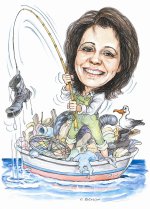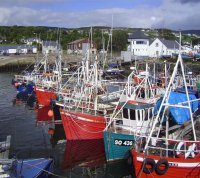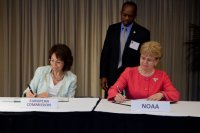Presentation of Common Fisheries Policy Reform to European Parliament Environment Committee

European Parliemant
Brussels, 19 December 2011
Commissioner Damanaki discussed the proposals for a reform of the Common Fisheries Policy with the Members of the European Parliament Committee for Environment, Public Health and Food Safety.

Dear Members of Parliament,
The sea is ill. And so is our economy. While countries suffer from the crisis and take painful austerity measures, those who make a living from fishing are doubly hit: on one side the recession, on the other overfished stocks, low profits and grim prospects for the future.
I'm sure you have seen the figures: 75% of the stocks are overfished in the EU. Only 8 stocks out of 136 would be at sustainable levels in 2022 if we went on with business as usual. 35% of fishing businesses are operating at a loss. 30% of the jobs in the catching sector have been lost in the past decade.
We have to help the sea – and we have to help the hundreds of thousands of people who make a living from the sea. The two go hand in hand. We have to invest in our coastal communities and enable them to turn this crisis into an opportunity. We have to give them a chance to be "green". This is why the Commission proposed, in July this year, a radical reform of the Common Fisheries Policy.
How will this reform deliver change?
In two ways. First of all with our agenda for sustainability.
We must let fish stocks and ecosystems recover. Healthy, strong stocks are the pre-requisite for a healthy and strong fishing industry.
Fishing stocks sustainably by 2015, in line with our international commitments, is an objective that we all have to embrace. Multi-annual plans are a necessity to translate this objective for individual stocks or ecosystems.
Fishing capacity needs to be reduced – there is no other way. As long as the vessels are too many and the fish are too few, the stocks will not reproduce and people will not make a profit.
Discarding, this wasteful practice, needs to be fought head on. Discards should be eliminated gradually, one stock after another.
But we can't just declare sustainability as an intent. We also have to help the fishermen switch to greener practices. This is the second way to overcome the crisis. The recently tabled European Fisheries and Maritime Fund can contribute significantly to facilitate this transition.
Today I want to explain to you how the European Maritime and Fisheries Fund will assist us on our way to environmental sustainability – and that sustainability is the only way to obtain the social and economic security that the people in the fishing industry deserve.
For the period from 2014 to 2020 we have 6.5 billion euro, which is not negligible.
But we will no longer spend huge sums on scrapping vessels: despite nearly 3 billion euro spent since the nineties, this has proven inefficient. We will rather invest on delivering the reform: helping the transition to sustainable fishing and aquaculture on one hand, and diversifying the economy of coastal and rural areas on the other.
Let's start with the latter: we want to help the maritime economy move away from fishing and find new branches of activity. This is very important.
So the new Fund will help fishermen start up businesses outside fishing; we will provide them with professional advice on business and marketing strategies and give them special support for innovative ideas.
If their life partner wants to set up their own business like buying a minivan, for instance, to supply local restaurants with fresh fish, we will help them too.
We will support vocational training, re-qualification and life-long learning.
Similar incentives will apply to fish farmers too. If they want to grow algae for the production of cosmetics or medicines, for instance, we will help them. If they want to supplement their income by opening up their facilities to tourists, anglers or students, they will get support.
We will also support fishermen who help us manage, monitor and restore NATURA 2000 sites and other Marine Protected Areas.
We will support those who help us collect biological or socio-economic data. We need good data to improve our management, our policy; and who better than the fishermen to submit them?
Moreover, the fishermen working on the sea and the scientists studying the sea are two sides of the same coin. The new Fund will encourage them to work in tandem to find ways to exploit natural resources in a sustainable manner.
In sum, ladies and gentlemen, diversification creates new jobs – attractive, safe and high-quality jobs for those Europeans who live near the sea.
Diversification means that small-scale fishermen have a second leg to stand on and can use their know-how on alternative occupations.
And it means shifting the focus away from a heavy-impact activity like fishing towards smart and green activities like marine or agro-tourism, sea cleaning and so on. In my book, this is smart growth.
I said we also need to help the transition to sustainable fishing and sustainable aquaculture.
Let me explain with an example… discards, for instance. They are an outrage and need to be phased out. What is hauled up in the nets has to be landed. This is my proposal.
But we will give the fishermen proper support for that. If they want to equip their boats with more selective nets, or experiment new methods, they can receive aid. They will receive aid to store the discards on board. And both ports and Producers' Organisations will receive aid to be able to deal with the landed discards.
We want to promote new ideas and products, new services and fishing techniques; we want innovation to come from the fishing communities themselves.
So we will support all new approaches which might lower the impact of fishing activities on the environment, spare the sea bottom, increase selectivity and reduce fuel consumption.
We are determined to reduce the footprint of fishing on the environment under all respects.
I'm sure that this committee will appreciate perhaps the greatest novelty in the new fund: conditionality. Support will only be granted to Member States and operators that comply with the rules: especially those on control and illegal fishing and the obligation regarding data collection.
Ladies and gentlemen,
We need to let the sea rest.
This crisis may not be the end of fishing, but it is a lesson to learn to fish in a more sustainable way and to find alternative sources of income.
Many coastal communities in Europe have learnt this lesson and are already developing other sectors, like fish processing, eco-tourism, port facilities, wind energy and so on.
This is the key to the future, at least for the maritime world.
In the next few years we need to focus on people, and help them embrace the change. We need to focus on fisheries communities, and create new jobs and boost growth. And we need to focus on sustainability, reversing the decline of the fisheries sector of recent times.
With our fisheries reform and the new funding instrument we propose to do just that.
Thank you.

 Follow me on Twitter
Follow me on Twitter
 Follow me on YouTube
Follow me on YouTube












